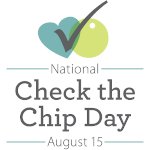National Check the Chip Day Date in the current year: August 15, 2026
 National Check the Chip Day is celebrated annually on August 15. It was created to remind pet owners to get their pets microchipped or, if they are already microchipped, to make sure their registration information is up-to-date.
National Check the Chip Day is celebrated annually on August 15. It was created to remind pet owners to get their pets microchipped or, if they are already microchipped, to make sure their registration information is up-to-date.A pet microchip implant is a tiny chip (about the size of a large rice grain) storing a unique ID number linked to a microchip registry. It is implanted under an animal’s skin by a veterinarian or pet shelter staff; the procedure causes only minimal and short-lived discomfort, and the chip itself isn’t supposed to cause any discomfort at all.
Pet microchips are based on passive radio-frequency identification technology (RFID). This means that they remain inert most of the time, but when triggered by a special scanner, they transmit the ID number to the scanner. Once the person scanning the chip gets its ID number, they can look it up in the registry.
Microchip registries typically store information such as the owner’s name, contact details and home address, the pet’s name, gender and date of birth, their breed, fur color and any identifying details, etc. They can be operated by the chip manufacturer or distributor, a pet recovery service, or a national pet database if the country where the microchip was implanted has one. A microchip can be registered in several databases, but the one that vets, animal control and pet shelter staff will refer to is the database maintained by the microchip manufacturer.
A microchip won’t replace a tag and collar, which is the easiest way to identify a pet’s owner, but they can make all the difference when it comes to reuniting with your lost pet. According to statistics provided by the American Veterinary Medicine Association, one in three family pets will get lost at some point; a microchipped dog is more than twice as likely to be returned to its owner than a dog with no microchip, and a microchipped cat is more than 20 times as likely to reunite with its owner.
When a microchipped pet isn’t returned to the owner, its typically because owner information is incorrect or missing from the microchip registry. This is why it is important to not just have your pet microchipped, but to make sure that it’s registered with the manufacturer and that owner information in the registry is up-to-date. You should have the microchip scanned during your pet’s annual checkup at the vet and update your pet’s microchip information as soon as possible if your address/phone number changes.
National Check the Chip Day is promoted by the American Veterinary Medicine Association and HomeAgain, a lost pet recovery service. Its main goal is to raise awareness of the benefits of microchipping and encourage pet owners to have their pets microchipped even though it is not mandatory. If your pet is already microchipped, National Check the Chip Day is the day when you should check its registration information and update it if it’s incorrect or incomplete. And don’t forget to urge fellow pet owners to do the same by spreading the word about the holiday on social media with the hashtag #NationalCheckTheChipDay.
- Category
- Ecological Observances
- Country
- USA
- Tags
- National Check the Chip Day, observances in the US, animal-related observances, pet microchip implants, microchip registry